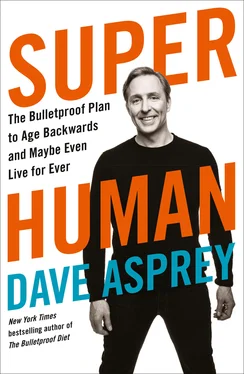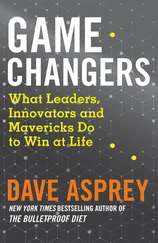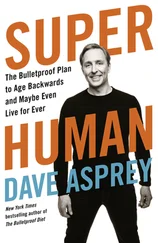There is new evidence that maintaining normal amounts of muscle strength as you age can help ward off this killer. In a study following five thousand people for over twenty-five years, participants were given regular strength tests. The risk of diabetes was slashed by 32 percent in those with even moderate muscle strength as opposed to those with low muscle strength. 12The reduced risk did not change if the participants were even stronger, so you don’t have to get ripped to live longer, but you should avoid carrying excess fat.
I had no idea as an obese teenager that inflammation was making it difficult for me to control my blood sugar. Instead, I bought into the myth that I just wasn’t trying hard enough to lose weight. I exercised a ton and constantly watched what I ate. For breakfast, I had Grape-Nuts, which were supposed to give me energy, and skim milk, which was meant to do my body good. But they did neither of those things. I distinctly remember one morning in ninth grade eating a bowl of Grape-Nuts with skim milk to prepare for a big soccer match. I was convinced this was a healthy breakfast, but I didn’t perform very well in the game. I thought to myself afterward, Well, that didn’t work the way it was supposed to.
This was the first time I questioned conventional wisdom about what was actually good for me. It would be many more years before I started to get real answers, but in my desperation I started experimenting with things that no teenager should need to explore. I was sick of feeling like an old man. So I started reading everything I could get my hands on that offered some advice for how to feel and perform better. While my peers were (I assume) out drinking and having fun, I was at home biohacking.
For my knee pain, I tried the glucosamine pills from the health food store, and they brought some serious relief. I didn’t know it then, but glucosamine inhibits glycolysis, your body’s breakdown of glucose (sugar). As a result, your body has to get energy from fat instead of sugar, which helps prevent insulin resistance. Recent research on mice has found that glucosamine promotes mitochondrial biogenesis (the birth of new mitochondria) and mimics the effects of calorie restriction. 13And there are plenty of studies to show that calorie restriction (a diet consisting of fewer than 1,200 calories a day) in conjunction with good nutrition extends life-span. In mice, calorie restriction can extend life-span by as much as 40 percent. Most researchers estimate that the impact on humans is more like 10 percent, which is still pretty amazing 14—if you’re willing to be hungry, anyway.
If you’re like most people, you don’t enjoy feeling hungry, and you don’t want to restrict your calories to fewer than 1,200 a day. The good news is that researchers have been testing compounds that mimic the benefits of calorie restriction without the starvation. Glucosamine is one of those compounds. In one study, glucosamine extended the life-span of mice by 10 percent. 15And it most likely helped with my knee pain because of the way it impacted my body’s sugar metabolism.
Despite this small win, I was heavier than ever and fed up. In college I spent eighteen months working out six days a week for an hour and a half at a time while on a low-calorie, low-fat semi-vegetarian diet with lots of rice and beans and everything that was supposed to be good for me. I got really strong, but I was still covered in blubber, and later blood tests revealed that I was prediabetic thanks to all that fat and the inflammation it was fueling.
I knew something had to change, but I had no idea what that thing was. Then one day while I was at a coffee shop getting my daily fix, I spotted a weightlifting magazine on a rack. No one I knew in my small farming town read weightlifting magazines, but something on the cover caught my eye. It said, “How to grow abs!” Looking down at what I had grown—which you could more accurately call flabs —I thought, I have to read this. The goal seemed impossible in the world I lived in.
As I sipped a triple latte, I read an article by a body builder with impressive abs who said that sugar and carbohydrates make you fat. That advice was radical at the time and is still mildly controversial today, but it has become much more widely accepted since we know for a fact that sugar causes inflammation. 16Even small spikes of blood sugar have a particularly bad effect on your vascular system (and raise your cancer risk, too). 17I grabbed the magazine, went home, and made a smoothie out of cottage cheese and orange juice. I had no idea what I was doing! But that gross smoothie still had fewer carbs than I was used to eating in my efforts to get healthy.
I started eating more protein and avoiding grains and most obvious sources of sugar, for the first time focusing more on what I didn’t eat (carbs) than how much I ate. In three months I lost fifty pounds, but more surprising were the changes to my personality. Everyone in my life noticed that I was a lot nicer, and I actually started to develop friendships. I had changed my biology enough that I wasn’t exhausted all the time, and my brain was able to learn how to connect with people, even though it still didn’t come naturally to me. My focus in class also improved, and my GPA went up dramatically, from a 2.8 the previous semester to a double course load with a 3.9.
That’s right—avoiding grains and sugar helped me reduce inflammation, stabilize my blood sugar, get smarter, and change my personality for the better. Once again, everything is connected. Realizing I’d been fed a bunch of lies (literally) about what to eat for most of my life, I dug into the research and tried different strategies, evolving from the cottage cheese smoothie to the Zone diet to Atkins. (Though I never got anywhere close to the abs promised in that magazine.) Eventually I realized that there had to be a science to this. There were clearly foods out there that acted as kryptonite, caused inflammation, and completely threw me off of my game. And when I ate them, I not only felt awful, but I was also one step closer to developing type 2 diabetes. It took me years, but I finally discovered what those inflammatory foods were and how to avoid them. You’ll read more about this in chapter 3.
ALZHEIMER’S
Just as immune cells in your body fat create inflammation that contributes to diabetes, there are specialized immune cells in the brain called microglia that perform similar functions. They control the brain’s immune and inflammatory response and are also in charge of killing off dysfunctional neurons in a process similar to apoptosis. The microglial cells constantly monitor the brain, and when they sense a threat, they trigger the release of inflammatory cytokines to attack and remove potential pathogens. This process causes inflammation, and if it becomes chronic this can damage or kill neurons, causing memory loss and other cognitive problems. 18Many researchers now believe that this is the root of Alzheimer’s.
In my twenties I was already experiencing significant cognitive dysfunction, and I wondered in the back of my mind if I was on track for developing Alzheimer’s. When I was in business school in the 1990s, my performance on tests was horrible. On exams with math questions, my grades showed a linear decline in per-question scores—100 percent on the first question, 70 percent on the next, 30 percent on the next, and directly downhill from there. My brain got fatigued so easily, even when I studied and knew the answers.
This experience led me to imagine what would happen if I couldn’t rely on my brain to earn a living. I’d had a successful career so far, but suddenly I wondered if I wasn’t as smart as I thought I was. I decided to undergo a then controversial brain imaging technique called a SPECT scan to see what was really going on in my brain. It showed that my prefrontal cortex—the part of the brain involved in complex thinking and decision-making—had essentially no activity when I tried to concentrate. Dr. Daniel Amen, who was one of the first people in this country to use SPECT scans, was shocked that I had been even remotely successful in my career with such clear cognitive dysfunction.
Читать дальше






